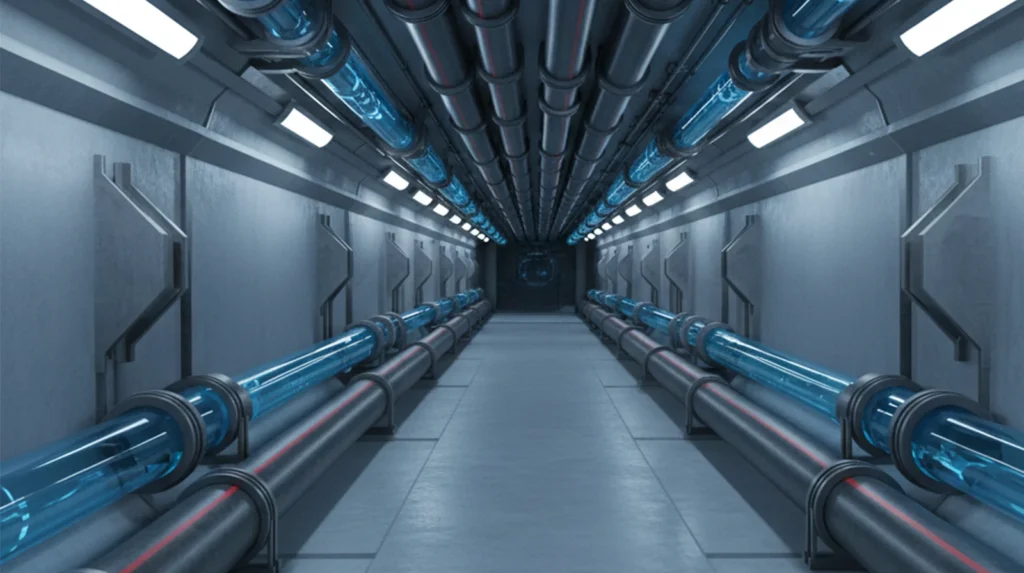Have you ever wondered why the reliability of water supply systems is crucial for both businesses and households? The constant need for high-quality, durable, and cost-effective solutions in water supply systems has led to the development of advanced materials. One such innovation is UPP (Unplasticized Polypropylene) layered pipes.
These pipes offer numerous benefits, especially in environments demanding high performance and reliability. If you’re looking to upgrade or design a water supply system, understanding the advantages of UPP layered pipes could be the game changer you need.
In this article, we will explore why UPP layered pipes are becoming a top choice for water supply systems, and how they can provide a long-term solution to common challenges. Whether you’re a business owner, engineer, or supplier, you’ll gain insights into how UPP pipes can enhance your infrastructure, reduce maintenance costs, and ensure safe water delivery.
What Are UPP Layered Pipes?
Before diving into their benefits, it’s important to understand what UPP layered pipes are and how they differ from other piping materials.
What makes UPP Layered Pipes Unique?
UPP layered pipes are made from a multi-layer structure, where the inner and outer layers are composed of high-performance polypropylene, while the middle layer may consist of materials that enhance strength and flexibility. This layering system makes the pipes resistant to a variety of pressures, temperatures, and environmental factors.
The unique multi-layer construction provides the pipes with a balance of rigidity, chemical resistance, and flexibility, making them highly suited for water supply systems, especially in areas that deal with varying pressures and temperatures.
The Benefits of UPP Layered Pipes for Water Supply Systems
1. Durability and Longevity
One of the most significant benefits of UPP layered pipes is their remarkable durability. These pipes are designed to withstand harsh environmental conditions such as extreme temperatures, UV radiation, and exposure to chemicals commonly found in water. The multi-layered structure ensures that they resist cracking, corrosion, and abrasion, leading to a much longer lifespan compared to traditional pipes like PVC or metal pipes.
Real-World Example:
In a case study of a large municipal water supply project, UPP pipes were used for over 10 years without significant degradation, outperforming older PVC pipes that showed signs of wear and tear within just 5 years.
2. High Resistance to Pressure and Temperature
UPP pipes can handle high-pressure situations, making them an ideal choice for water supply systems in regions where water pressure fluctuates. The material can also maintain its structural integrity in both hot and cold conditions, ensuring that the water remains uncontaminated, and the pipe network operates efficiently.
Pro Tip: When selecting UPP pipes for high-pressure systems, make sure to check their pressure rating to match the system’s requirements for optimal performance.
3. Low Maintenance Costs
One of the most compelling reasons businesses and municipalities are turning to UPP layered pipes is the reduced need for frequent repairs and maintenance. Thanks to their resistance to corrosion, scale buildup, and cracking, UPP pipes do not require as much upkeep as traditional alternatives. This can significantly lower operational and maintenance costs over time.
Expert Insight:
According to industry experts, water systems using UPP pipes see a reduction in maintenance costs by up to 40% when compared to traditional steel or PVC systems.
4. Chemical and Corrosion Resistance
Water supply systems often face challenges due to the corrosive nature of certain chemicals or contaminants in the water. UPP layered pipes offer excellent resistance to a wide range of chemicals, ensuring that your water remains uncontaminated and safe for use. This chemical resistance also prevents rust and scaling, which is common in metal pipes, extending the life of the system.
Mini Case Study:
In a chemical plant’s water system, UPP pipes were installed to transport water with high levels of acidity. Over a period of five years, the pipes showed no signs of deterioration, while the old steel pipes had to be replaced multiple times due to rust and corrosion.
5. Eco-Friendly
UPP layered pipes are a more sustainable option for water supply systems due to their longevity and energy-efficient manufacturing process. The reduced need for frequent replacements and repairs leads to less waste and fewer resources used over time. Furthermore, UPP pipes are recyclable, making them an environmentally friendly choice for modern infrastructure.
Statistic:
According to a report by the Environmental Protection Agency (EPA), the use of sustainable piping materials like UPP can reduce environmental impact by up to 30% in large-scale infrastructure projects.
6. Cost-Effectiveness
While UPP pipes may have a higher upfront cost compared to traditional options like PVC or HDPE, their long lifespan and reduced maintenance needs offer a significant return on investment. Over time, the savings from fewer repairs, replacements, and disruptions to water supply systems make UPP pipes an economical choice.
Real-World Example:
A water utility company that switched to UPP pipes for its main distribution lines saw a reduction in annual maintenance costs by 25%, providing long-term savings despite the initial installation expense.
7. Ease of Installation
UPP layered pipes are lightweight and easy to install, requiring fewer resources and less time compared to metal pipes. This can significantly reduce installation costs and project timelines, making them a viable option for both large-scale and small-scale water supply systems.
Checklist for Installing UPP Pipes:
Ensure proper alignment and secure fittings
Avoid sharp bends that could weaken the pipe structure
Conduct pressure tests post-installation for assurance
8. Flexibility and Adaptability
UPP pipes are highly flexible, which makes them suitable for use in a variety of environments, including areas with shifting soil or frequent ground movements. This adaptability minimizes the risk of pipeline damage during natural events such as earthquakes or heavy rains.
Conclusion
In summary, UPP layered pipes offer a wealth of benefits for water supply systems, from their unmatched durability and resistance to corrosion, to their long-term cost-effectiveness and eco-friendliness. By making the switch to UPP pipes, businesses and municipalities can ensure a reliable, sustainable, and efficient water delivery system that stands the test of time.
If you’re considering upgrading your water supply system, investing in UPP layered pipes is a decision that could save you money, reduce maintenance headaches, and contribute to a greener environment. To learn more about how UPP pipes can benefit your infrastructure, contact a professional supplier today.
High-Quality Pipes & Fittings – Built to Last
FAQ Section
1. What makes UPP layered pipes ideal for water supply systems?
UPP layered pipes are durable, resistant to pressure, temperature, and chemicals, and require minimal maintenance, making them an ideal choice for reliable water supply systems.
2. How long do UPP pipes last?
UPP pipes typically last much longer than traditional piping materials. With proper installation, they can last for decades, outlasting PVC and metal pipes by 2-3 times.
3. Are UPP layered pipes suitable for all climates?
Yes, UPP pipes are highly adaptable and perform well in both hot and cold climates. Their resistance to temperature variations ensures reliable performance in any environment.
4. Can UPP pipes be used for high-pressure water systems?
Yes, UPP pipes are designed to handle high-pressure situations, making them suitable for both residential and industrial water supply systems.
5. Are UPP pipes environmentally friendly?
Yes, UPP pipes are sustainable due to their longevity, recyclability, and reduced environmental impact compared to other materials like PVC or metal pipes.
6. What are the installation requirements for UPP pipes?
Installing UPP pipes requires proper alignment, secure fittings, and a post-installation pressure test. Due to their flexibility and lightweight nature, installation is quick and easy.
7. Are UPP pipes cost-effective?
While UPP pipes may have a higher initial cost, their durability, low maintenance, and long lifespan make them a cost-effective choice in the long term.


